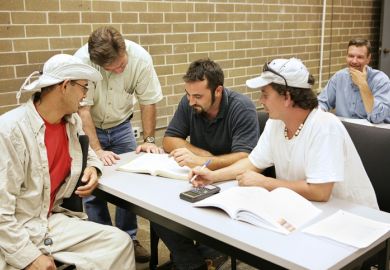There are many who believe that trying to direct academics is like herding cats. As people who have all attempted this feat at various points in our careers, we know that some can certainly be resistant to changing their teaching. But the idea that the research evidence of an entire discipline can be ignored simply because of one or two poor experiences with particular education specialists is untenable. Thus, it was no surprise to see an argument erupt on Twitter last week over an article in Times Higher Education titled “Pedagogy has nothing to teach us”.
It would be easy to criticise the author of this anonymous piece, as some have done, on the grounds that they admit to not being drawn to teaching. It is clear that for some in higher education, research is their love, teaching the chore (think about the terminology – “research time”, “teaching load”). But, over the years, a number of quite negative articles about teaching development have appeared; indeed, the arguments are ones that we have all heard from others, and they are worthy of consideration. So we intend to offer here a more positive view of how educational development can help academics develop as scholars.
The first issue raised by the THE article is terminology. The word pedagogy to which the writer objects so violently is not altogether helpful, even to those within the discipline, as it summons up images of strict or pedantic teachers teaching small children! But every discipline has its own language and education’s is, in most cases, no more complex or contested than that of any other field. It is one of the jobs of an educational developer to translate that terminology for those unfamiliar with the discipline.
A second issue is the use of research to inform policy, practice and decision-making. This is rarely embraced in universities, but using evidence to enhance teaching seems to attract particular ire, with the quality of pedagogic research often being called into question. Without doubt there is some inconsistency and poor research in the literature, as there is in any field. But this is where the guidance of an expert can help sift through papers, draw attention to key theories, and entertain critique and challenge when these come from a position of knowledge.
Institutions need to invest in attractive scholarly roles and career tracks for educational developers with the expertise and standing needed to carry out this role. This is vital if academics are to be helped to understand that while education theories are often context dependent, they offer a springboard for enhancing teaching that goes beyond unscholarly trial and error.
Those developers need to understand discipline-specific as well as generic educational practices and cultures. There is a growing literature on discipline-specific approaches to education and our disciplinary pedagogies can and should form part of our teaching tool kit, supporting our students to engage in important disciplinary ways of thinking and doing.
However, we must also puncture the enduring belief – expressed in the THE article – that because some education research is irrelevant across disciplines, any teaching course that covers a range of subjects is unhelpful. Academics are surely able to recognise that some principles play out similarly across disciplines. Teaching is so much more than telling students about research and knowledge, after all. And there is no doubt that teaching, in and of itself, can generate and extend disciplinary understandings.
Let’s remember that disciplines are neither exclusive nor static. Their infinite nature (forever expanding our knowledge and understanding) and porous boundaries provide opportunities for new ways of thinking and doing to emerge from a range of directions. We have witnessed ourselves how integrating new approaches to teaching and learning can shine a light on disciplinary practices, making the familiar strange and leading to changed perceptions.
As comments under the THE article note, this is an increasingly polarised debate, picking up on binaries that have been pulled into further tension by external pressures, such as the UK’s separate teaching and research excellence frameworks. So we’d like to conclude with a plea to bring teaching and research closer together. As academics with both research and teaching roles, we recognise the importance of using evidence to underpin what we do in higher education – including pedagogic research and engaging students in research processes. We also recognise the importance of interdisciplinary approaches to resolving “wicked” 21st century problems.
Great education, within and across disciplines, engages students in active investigations and connects them with cutting-edge research and practice in their field and beyond – using models such as the Connected Curriculum. As educators, we can model scholarship, not only in our own specialisms but also by drawing on pedagogic research that shines a light on curriculum design, teaching and learning, and student assessment.
Those academics who are willing to doubt what they think they know and to interrogate critically tacit assumptions, received wisdom and “common sense” are demonstrating a truly scholarly approach to being educators. Let’s keep our discussions civil and our minds open – just as we ask our students to do.
Debby Cotton is director of academic practice and PGR co-ordinator (education) at Plymouth Marjon University. Elizabeth Cleaver is pro vice-chancellor (education and digital) at Bucks New University. Dilly Fung is pro-director for education at the London School of Economics and professor in practice at the LSE School of Public Policy.
Register to continue
Why register?
- Registration is free and only takes a moment
- Once registered, you can read 3 articles a month
- Sign up for our newsletter
Subscribe
Or subscribe for unlimited access to:
- Unlimited access to news, views, insights & reviews
- Digital editions
- Digital access to THE’s university and college rankings analysis
Already registered or a current subscriber?








